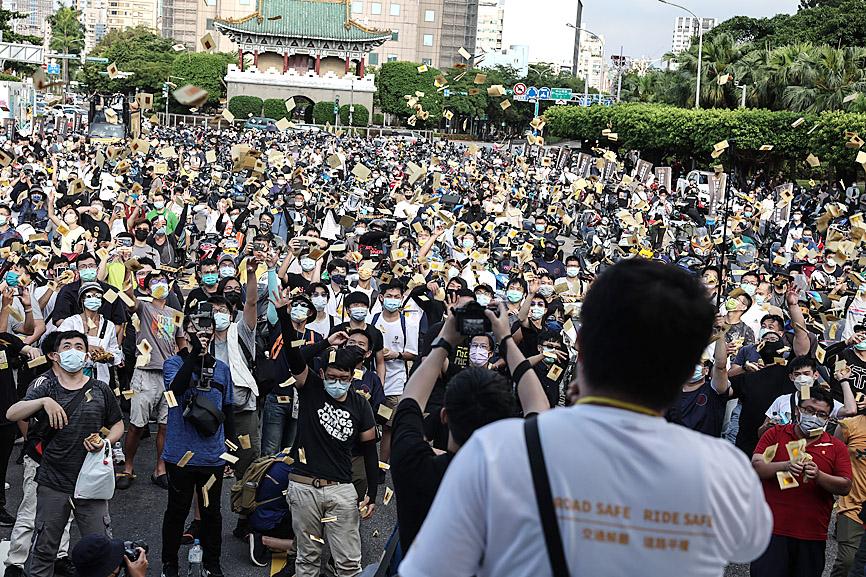People on motorcycles and scooters took to major thoroughfares in Taipei for a rally yesterday afternoon, headed by advocates demanding the right to ride on major provincial highways and an end to other thoroughfares being designed predominantly for cars.
The rally, organized by the Formosa Motorcycle Rights Association, was attended by New Power Party (NPP) legislators Chen Jiau-hua (陳椒華), Chiu Hsien-chih (邱顯智), and Claire Wang (王婉諭), along with representatives from the Green Party Taiwan and the Taiwan Renewal Party.
About 5,000 riders and their two-wheeled vehicles assembled by Taipei Expo Park and proceeded to Ketagalan Boulevard, parking their motorcycles, scooters and bicycles in front of the Ministry of Foreign Affairs Building.

Photo: CNA
Taiwan averages about 3,000 fatalities yearly in road mishaps and collisions, association spokesman Huang Po-yue (黃柏岳) said.
“This is too many people killed on the road. It should be considered a national security crisis,” Huang said.
“Policies governing road use and traffic safety regulations are replete with dangers to drivers and riders,” he said. “Taiwan’s roads are badly planned and poorly designed.”
He said government leaders and Ministry of Transportation and Communications (MOTC) officials were not listening to voices and complaints from concerned citizens over the years, adding that the government agency responsible for road safety and policy changes is monopolized by small cliques of ministry officials, academics and representatives of transportation companies.
The rally’s theme was “Lift Martial Law on the Road,” referencing how far some “outdated restrictions and bizarre rules” date back.
Some of the demands made yesterday were to permit the use of motorcycles and scooters on provincial highways, end two-step left-turn requirements for motorcycles at intersections, end the use of speed-limit cameras, and for citizen representation on MOTC committees governing road safety.
Taiwan has more than 14 million motorcycles and scooters, while cars number 8 million, Chen said.
“The government has designated most roads for cars only,” she said. “Motorcycles and pedestrians mix dangerously on the periphery of roads. It is unjust.”
Ministry officials designate separate lanes for cars and motorcycles for stated safety reasons, but Chen said that cars often cut into motorcycle traffic.
“Then you have buses pulling over at stops, and pedestrians and people in wheelchairs using the outer lanes when sidewalks get blocked, plus vehicles crowding at intersections to make right turns,” she said. “This increases the chance of collisions.”
The government has been negligent for too long, Chen said.
Officials responsible for road design and safety have been derelict in their duties for too many years, Chen said, adding: “Citizens pay the price in blood and lost lives... It has become so bad that travel guidebooks in the US and Japan, for instance, give stern warnings about Taiwan’s dangerous traffic conditions.”
Chen and other NPP legislators supported the rally to advocate for “equal rights” for road use.
“Taiwan must have traffic policies that respect the rights and safety of all pedestrians, cars and two-wheeled vehicles,” she said.

The manufacture of the remaining 28 M1A2T Abrams tanks Taiwan purchased from the US has recently been completed, and they are expected to be delivered within the next one to two months, a source said yesterday. The Ministry of National Defense is arranging cargo ships to transport the tanks to Taiwan as soon as possible, said the source, who is familiar with the matter. The estimated arrival time ranges from late this month to early next month, the source said. The 28 Abrams tanks make up the third and final batch of a total of 108 tanks, valued at about NT$40.5 billion

Two Taiwanese prosecutors were questioned by Chinese security personnel at their hotel during a trip to China’s Henan Province this month, the Mainland Affairs Council (MAC) said yesterday. The officers had personal information on the prosecutors, including “when they were assigned to their posts, their work locations and job titles,” MAC Deputy Minister and spokesman Liang Wen-chieh (梁文傑) said. On top of asking about their agencies and positions, the officers also questioned the prosecutors about the Cross-Strait Joint Crime-Fighting and Judicial Mutual Assistance Agreement, a pact that serves as the framework for Taiwan-China cooperation on combating crime and providing judicial assistance, Liang

A group from the Taiwanese Designers in Australia association yesterday represented Taiwan at the Midsumma Pride March in Melbourne. The march, held in the St. Kilda suburb, is the city’s largest LGBTQIA+ parade and the flagship event of the annual Midsumma Festival. It attracted more than 45,000 spectators who supported the 400 groups and 10,000 marchers that participated this year, the association said. Taiwanese Designers said they organized a team to march for Taiwan this year, joining politicians, government agencies, professionals and community organizations in showing support for LGBTQIA+ people and diverse communities. As the first country in Asia to legalize same-sex

MOTIVES QUESTIONED The PLA considers Xi’s policies toward Taiwan to be driven by personal considerations rather than military assessment, the Epoch Times reports Chinese President Xi Jinping’s (習近平) latest purge of the Chinese People’s Liberation Army (PLA) leadership might have been prompted by the military’s opposition to plans of invading Taiwan, the Epoch Times said. The Chinese military opposes waging war against Taiwan by a large consensus, putting it at odds with Xi’s vision, the Falun Gong-affiliated daily said in a report on Thursday, citing anonymous sources with insight into the PLA’s inner workings. The opposition is not the opinion of a few generals, but a widely shared view among the PLA cadre, the Epoch Times cited them as saying. “Chinese forces know full well that